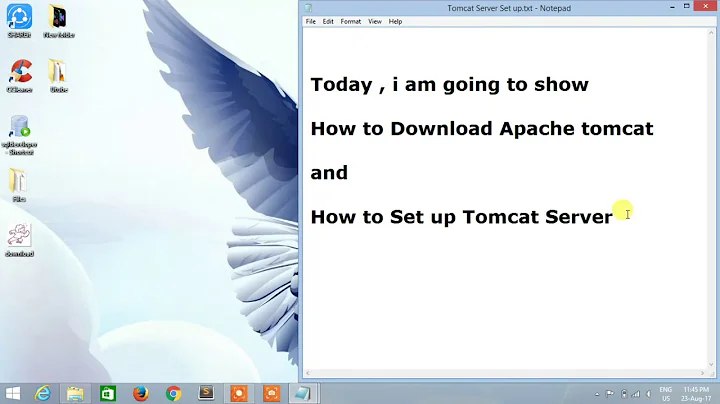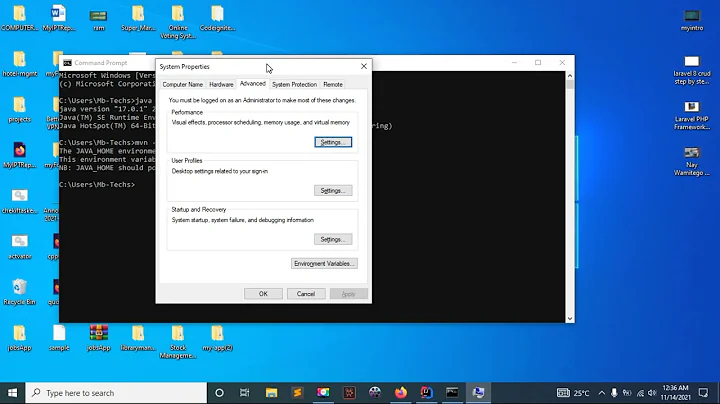Tomcat does not recognize JAVA_HOME
Solution 1
There is a help text in catalina.sh. I will quote it here:
# Do not set the variables in this script. Instead put them into a script
# setenv.sh in CATALINA_BASE/bin to keep your customizations separate.
#
# JAVA_HOME Must point at your Java Development Kit installation.
# Required to run the with the "debug" argument.
# Ensure that any user defined CLASSPATH variables are not used on startup,
# but allow them to be specified in setenv.sh, in rare case when it is needed.
CLASSPATH=
if [ -r "$CATALINA_BASE/bin/setenv.sh" ]; then
. "$CATALINA_BASE/bin/setenv.sh"
elif [ -r "$CATALINA_HOME/bin/setenv.sh" ]; then
. "$CATALINA_HOME/bin/setenv.sh"
fi
When you starting tomcat using catalina.sh, it searching for file setenv.sh and sourcing it. It is searching in CATALINA_HOME or CATALINA_BASE.
So the better way to set JAVA_HOME for the tomcat is:
- Create a script named
setenv.shin the folderCATALINA_BASE/bin, if it does not exist already. Add this line to
setenv.shexport JAVA_HOME=/opt/java/jdk1.8.0_05Make it executable.
Why you should use this solution:
Setting environment variable in script is safer. Always try to set variables as locally as possible. Try do not use /etc/environment, /etc/profile and others if you really do not need Global Environment Variable. Setting JAVA_HOME in setenv.sh gives you ability to use different tomcats with different applications that need different version of java, but running by one user. Other user environment would not be affected by you.
Solution 2
Since you have set the environment variable for your own user and not for the superuser, you have two options:
You will have to export the variable using
-Eoption as follows:sudo -E /opt/tomcat7/apache-tomcat-7.0.53/bin/startup.shNote that this will export all environment variables while running the command. This is not preferred since the normal users environment is spilled out when you run the command as root. This is not desirable.
Export the variable in
root's.bashrc/etc/enviromentfile. Open a terminal and type:sudo nano /etc/environmentand enter your administrative password, and add the following lines to the end of the file:
JAVA_HOME=/opt/java/jdk1.8.0_05 PATH=$PATH:$JAVA_HOME/binand then
source /etc/environmentor restart your machine and then retry the command you were using.
Update:
This answer provided hints as two why step 2 wouldn't work, sudo would reset the environment and provide a secure path, so all global variables are reset. A workaround would be to use
sudo su
and then execute command which uses the set environment variables.
Related videos on Youtube
isapir
Updated on September 18, 2022Comments
-
 isapir over 1 year
isapir over 1 yearI've installed Ubuntu 14.04 Server, extracted JDK1.8u5 and Tomcat7, and added the following to .profile (I also tried adding it to .bashrc with similar [non-] results):
export JAVA_HOME=/opt/java/jdk1.8.0_05 export PATH=$PATH:$JAVA_HOME/binwhen I run
echo $JAVA_HOMEI get the expected result of/opt/java/jdk1.8.0_05. I can also runjava -versionand get the correct response from Java. so far so good.so now I try to startup Tomcat (tried also catalina.sh), and I get the following:
user@ubuntu:~$ sudo /opt/tomcat7/apache-tomcat-7.0.53/bin/startup.sh Neither the JAVA_HOME nor the JRE_HOME environment variable is defined At least one of these environment variable is needed to run this programbut... I just tried
echo $JAVA_HOMEand it worked? -
 isapir almost 10 yearsThanks @Jobin -- option 1 works so I upvoted your answer. I will now check option 2, which is my preferred solution, and if it works I will accept your answer.
isapir almost 10 yearsThanks @Jobin -- option 1 works so I upvoted your answer. I will now check option 2, which is my preferred solution, and if it works I will accept your answer. -
jobin almost 10 years@Igal: Edited my answer to solve that issue, you should first use
sudo -ibefore yousource. Thanks for pointing that out. -
 isapir almost 10 yearsok, pardon the newbie questions, but how do I exit the
isapir almost 10 yearsok, pardon the newbie questions, but how do I exit thesudo -ionce I'vet called source? without exiting I am getting the original error message... -
jobin almost 10 years@Igal: Just press Ctrl + d or type
exit. -
 isapir almost 10 yearsdid that... but am still getting the original
isapir almost 10 yearsdid that... but am still getting the originalNeither the JAVA_HOME nor the JRE_HOME environment variable is defined:s -
jobin almost 10 years@Igal: Have modified my answer to reflect global environments file. Check if this helps, sorry for the incorrect file usage.
-
 isapir almost 10 yearsthank you for your patience... I made the changes to
isapir almost 10 yearsthank you for your patience... I made the changes to/etc/environmentand calledsource /etc/environmentbut still getting the original error message... -
jobin almost 10 years@Igal:
/etc/environementvariables are also reset, you would need to usesudo suand then run the/opt/tomcat7/apache-tomcat-7.0.53/bin/startup.sh. -
 isapir almost 10 years@Jobim thank you for your time and help. I really appreciate it.
isapir almost 10 years@Jobim thank you for your time and help. I really appreciate it. -
jobin almost 10 years@Igal: Oh yes, it can be, can you confirm if that works? Thanks!
-
 isapir almost 10 yearsYES! it worked :) but
isapir almost 10 yearsYES! it worked :) butsource /etc/environmentwas not enough. I had to reboot the server. thank you for your help!




